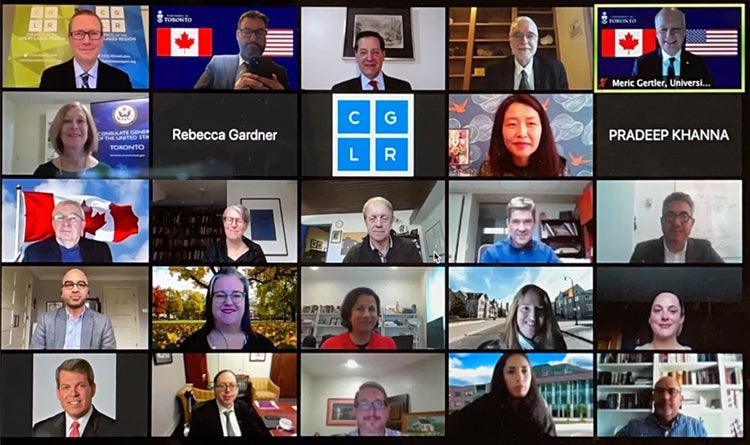U of T, University of Illinois form partnership to enhance global leadership of Great Lakes region
The University of Toronto and University of Illinois System are partnering with a binational network of organizations to launch a cross-border education consortium that aims to spur innovation, collaboration and long-term growth in the Great Lakes region.
Administered by the Council of the Great Lakes Region, the Great Lakes Higher Education Consortium will focus on regionally significant socioeconomic and environmental issues in a bid to help secure the region’s long-term competitiveness, development and sustainability.
The partners will also seek to engage businesses and governments on both sides of the border.
“Our institutions, our local regions and our countries are facing some major economic, social and environmental challenges, but also opportunities,” said U of T President Meric Gertler during a Zoom ceremony Thursday that included the signing of a memorandum of understanding.
“By working with each other, and with our partners in business and government, we can meet these challenges and seize these opportunities for our mutual benefit – and it is more important than ever that we do so.”
The virtual meeting was attended by senior leaders at the Council of the Great Lakes Region, the University of Illinois System and past and present U.S. diplomats, including Susan Crystal, who was recently appointed consul general in Toronto. The meeting also featured a message by Vic Fedeli, Ontario’s minister of economic development, job creation and trade.
The Great Lakes region is an economic engine for both Canada and the United States. It’s home to 57 of Fortune magazine’s Global 500 companies and more than eight million small and medium-sized businesses.
Like U of T, the University of Illinois System is one of the world’s top ranked public research universities and plays a major role in the region’s economic vitality. The state’s largest educational system contributes US$17.5 billion to the Illinois economy each year. Its graduates helped develop air conditioning, LED lighting and MRI technology, and founded such companies as PayPal and eBay, said President Timothy Killeen.
“Just imagine the possibilities when the University of Illinois partners with the University of Toronto and raises the banner for our region, to which will flock many other research-intensive universities,” Killeen said.

A virtual meeting was attended by senior leaders at the Council of the Great Lakes Region, the University of Illinois System and past and present U.S. diplomats, including Susan Crystal, who was recently appointed consul general in Toronto. The meeting also featured a message by Vic Fedeli, Ontario’s minister of economic development, job creation and trade.
The formation of a partnership between universities in the Great Lakes region was one of the key recommendations of a report by the Council of the Great Lakes Region, co-written by John Austin, director of the Michigan Economic Center and a non-resident senior fellow at the Brookings Institution.
The report says that, by banding together, regional universities can better address local talent gaps, create a hub for applied science and innovation and build bridges between university assets such as business incubators and accelerators.
“By launching the binational Great Lakes Higher Education Consortium, the stage is set for positioning the region as a global leader in producing the talent of the future, solving global challenges through innovation and supporting a new generation of entrepreneurs that will transform the region and drive commerce,” Mark Fisher, president and CEO of the council, said in a statement.
The new academic consortium will foster even greater cross-border collaboration between Great Lakes universities, government and business, said Crystal, the U.S. consul general in Toronto, who described the partnership as “a vital step towards developing relationships that are necessary to solve global challenges.
“By anchoring a cross-border initiative through academic partnerships in the Great Lakes region, we are also directly supporting the economic well-being of both of our countries.”

